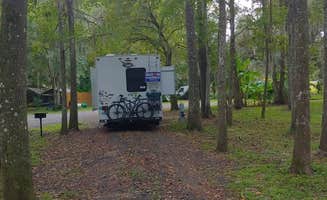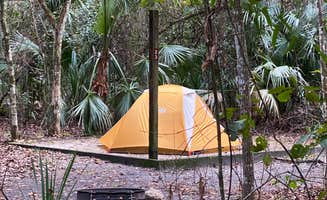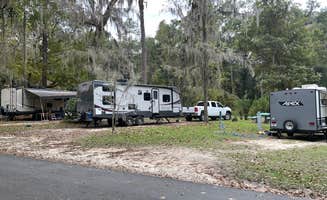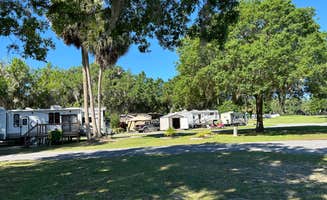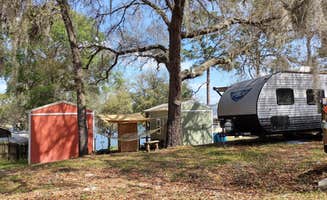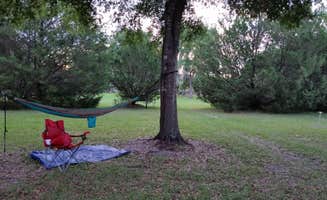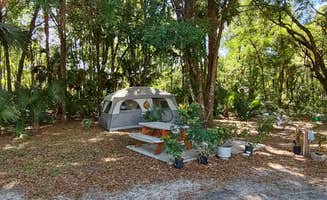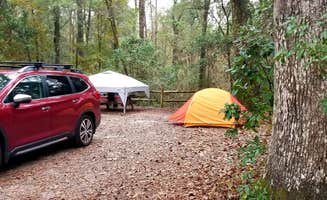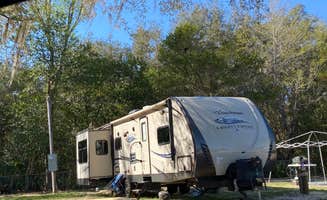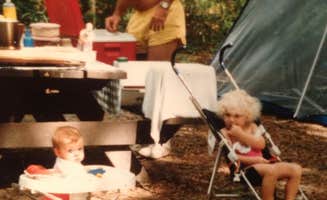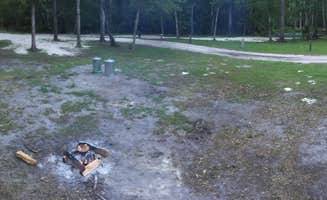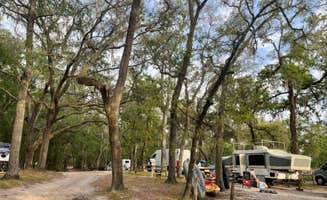Campsites near Gainesville, Florida offer distinct ecological transitions between wetland preserves and natural springs. Located in north-central Florida, the region sits approximately 150 feet above sea level with a mix of limestone bedrock, sandy soil, and multiple freshwater systems. Most campgrounds remain accessible year-round with fall through spring offering more comfortable camping temperatures in the 60-80°F range, while summer brings higher humidity and frequent afternoon thunderstorms.
What to do
Hiking unique terrain: The network of trails at O'Leno State Park offers surprisingly varied terrain for Florida. "There are nice elevation changes which makes it feel like your in the Carolinas or Georgia. The river is nice to see but I wouldn't swim or canoe it. Very fast and dark," notes one camper about the distinctive topography.
Wildlife viewing opportunities: Gopher tortoises, deer, and diverse bird species inhabit the region's parks. At Magnolia Campground, visitors report "tons of birds, tortoise, and deer. This is one of our favorite campgrounds." Morning hours provide optimal wildlife viewing conditions when animals are most active.
Kayaking underground river systems: The Santa Fe River at O'Leno State Park presents a geological phenomenon worth exploring. "The river goes underground but you can't kayak in this area," explains one visitor who enjoyed paddling above the disappearing river section. For beginners, guided tours range from $35-60 depending on trip length.
Spring swimming access: The 72-degree waters at Gilchrist Blue Springs State Park provide year-round swimming. One camper shares, "When you camp here you can use the spring before and after those who come for day use (there are a lot). In the evenings we had the spring to ourselves." Early morning and evening access gives campers exclusive use of the springs without day-use crowds.
What campers like
Primitive camping options: Backcountry camping requires preparation but rewards with solitude. "Backcountry camping is first come first serve— get there early to get a permit," advises one visitor to Paynes Prairie Preserve State Park.
Educational opportunities: Rangers provide insight into local ecosystems and history. "We did the Ranger led hike which was really nice, my 5 year old struggled to keep up with the Ranger and there are decent elevation changes," notes a family visiting Paynes Prairie Preserve State Park.
Historical structures: The CCC-era buildings at O'Leno State Park provide historical context. "All CCC construction. There is a picnic area, a pavilion, a lodge, a museum, several other structures," explains one visitor appreciating the preserved architecture from the 1930s.
Spring water clarity: Devil's Den Spring offers unique underwater views for snorkelers. "Beautiful campground with nice bathrooms. They have scuba lessons in pool if you have never dived. They also rent the equipment for both scuba and snorkeling," writes one camper who appreciated the facility's diving resources.
What you should know
Cell service limitations: Connection varies widely across the region. At Kate's Fish Camp, one camper reported, "I tried Verizon, T mobile and AT&T for Internet all sucked. My starlink mini was slow and dropped often they have a lot of shade."
Campsite type variations: Primitive sites may cost the same as developed ones at some parks. "Not their fault (the state sets pricing) but primitive campsites are the same price as reserved ones with hookups, $18," notes a visitor to Paynes Prairie.
Spring visitation patterns: Popular springs become extremely crowded, especially on weekends. "Ginnie Springs is an absolute blast! The float is gorgeous and the springs are clear and the perfect temperature all year round. My only advice would be do not bring small children to Ginnie. It is more like a huge party with plenty of drunken antics all day and all night," warns a camper about Ginnie Springs Outdoors.
Wildlife precautions: Hiking paths may harbor ticks and other pests. "Tried going on a little family hike and all ended up with ticks so make sure you spray really good if this is on your agenda," cautions a visitor to O'Leno State Park.
Tips for camping with families
Spring selection: Choose family-friendly water access points. "There are family friendly campgrounds on the springs nearby, but Ginnie is more adult," suggests one experienced visitor differentiating between the various spring options in the region.
Activity scheduling: Plan spring visits early. One Gilchrist Blue camper advises, "The proximity to the spring is what did it for me! We stayed in site 1 and it could see the spring from our RV." Morning access before day visitors arrive creates a more relaxed experience.
Educational trails: Select appropriate hiking distances for children. "The park has 8 trails for hiking, biking and horseback riding. We were able to see wild horses, bisons, snakes and gators," shares a Paynes Prairie visitor about the educational opportunities available.
Pest management: Apply insect repellent liberally before activities. "It's Florida, the summer, and unless you weren't already aware of it, you're landlocked here in the middle of the state, so what does that mean? Mosquitos and bugs," reminds a Kate's Fish Camp visitor.
Tips from RVers
Site selection: Travelers Campground offers convenient overnight accommodations. "The staff checks you in and then brings you to your location via a golf cart. Probably one of the best hospitality perks after a long day of driving," notes one RV camper appreciating the guided site placement.
Hookup variations: Water hookups may require extra equipment. "Site 1 in particular requires a looooooong hose. The hookups are all over the place and we couldn't even use water because of that," advises a camper at Gilchrist Blue Springs State Park.
Space limitations: Assess site dimensions carefully before booking. "The Magnolia loop is better suited for larger campers. We are 35' and are in the Magnolia loop but nearly hit a tree backing in," warns an RVer about navigating O'Leno State Park's campground loops.
Amenity differences: State parks offer varying levels of hookups. "The park doesn't have much in the way of amenities no septic nor washer or dryer," notes a visitor to O'Leno State Park, highlighting the need to plan for limited services.


